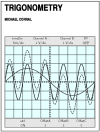Math 104 :: College Algebra :: Winter 2014
Mathematics is the language of science. It is the art of problem-solving. And if we care to look closely enough at the world around us, we will be amazed at the mathematics at play. It is my hope as your professor that you will take from this class a newfound appreciation of how mathematics fits into your world. Whether you are interested in the microscopic cells and chemical reactions occuring in your body, the local geography of the beautiful Upper Peninsula of Michigan, the global changes in our climate, the large-scale behavior of our universe, or maybe you are just interested in playing video games and listening to music - all of these things can be better understood, better explained, better appreciated with mathematics.
The catch is, however, that it takes a lot of work to understand the math behind the world. But the rewards are exponentially greater than the pain required to learn something new. This semester you will learn a lot of new mathematics and you will perhaps be surprised to see how far it will take you toward understanding your world a bit better.


Learning Objectives
Students will manipulate mathematical statements and solve mathematics problems. Students will use standard functions to describe natural phenomena. We will also graph functions and learn several equation solving techniques. We will use exponents, logarithms and systems of linear equations to solve problems real-world problems. We will also learn some elementary trigonometry and use it measure natural objects. Perhaps more importantly, students will gain an appreciation of the power and ability of mathematics in modeling the real world.
Resources
Math is not a spectator sport. You will have to get your hands dirty and it will not always be easy. Help can be found, however, and you can begin at the links to the right where you will find updated information, such as the syllabus for the course, found here, which contains information on prerequisites, grading policy, homework, study resources and a tentative course calender. The required textbook is pictured above, and can be found in the library or online. Want free sources to help you learn algebra? Look here.
Origins of Algebra
Where did the word "Algebra" and its underlying ideas come from?